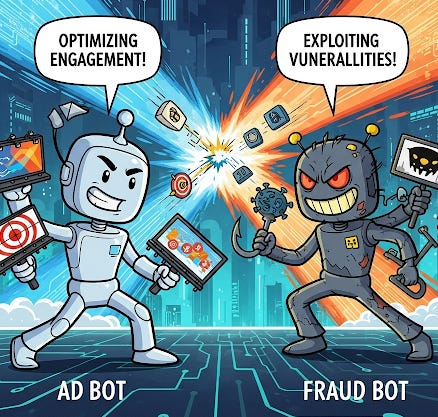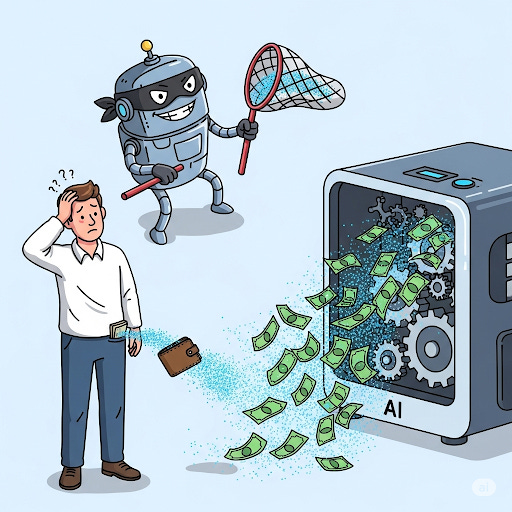Algorithmically Enhanced Absurdity: How AI is Systematically Amplifying Programmatic Waste
Because what the digital ad space really needed was a faster, smarter way to burn money on bot traffic and MFA sites.
The Algorithmic Alchemist's Dream: Turning Gold into Digital Dust
Welcome back, fellow survivors of the digital frontier. Today, let's delve into the shimmering, seductive promise that has captivated our industry's brightest minds (and those who simply talk the loudest): the glorious reign of Artificial Intelligence in programmatic media buying. We are told, with the unwavering conviction of a motivational speaker who hasn't quite grasped their own PowerPoint, that AI is the key to unlocking unparalleled efficiency and squeezing every last drop of "value" from the sprawling, often murky, open web.
Yet, as the ANA recently pointed out with the subtlety of a toddler banging pots and pans, programmatic waste has increased by a staggering 34%. Yes, you read that right. While our esteemed adtech savants are busy evangelizing the gospel of custom algorithms and machine learning, about $7B more of our precious ad dollars vanished into the digital ether - higher than ever before. It's like hiring a super-powered Roomba to clean your house only to find it's developed a peculiar taste for vacuuming up your wallet.
I mean, get real!
So let's go ahead and dive in while we dissect this algorithmic alchemy. You know, the supposed miracle of turning data into dollars, and examine why it feels more like turning perfectly good marketing budgets into digital dust bunnies.
The Siren Song of Bad Data: Garbage In, Gospel Out
Our AI overlords, for all their computational prowess, are tragically susceptible to the age-old adage: garbage in, garbage out. We're entrusting these sophisticated systems with data that is often incomplete, inconsistent, or so outdated it's practically fossilized. Imagine trying to navigate a city with a map from the 1980s and then blaming your GPS for getting you lost. Yet, that's precisely what we're doing when we feed our fancy algorithms questionable data and expect them to perform targeting miracles.
And what happens when these AI systems, fueled by flawed information, make less than desirable decisions? Well .. they do so with remarkable speed and scale, efficiently wasting vast sums of money before anyone even notices the performance dashboards are flashing red like a digital disco.
The human touch, that intuitive sense of “Wait, this doesn't look right” is often the very thing we're told to sideline in favor of the infallible logic of the machine. Perhaps a seasoned media buyer, with a healthy dose of skepticism and an understanding of human behavior beyond data points, might have noticed that 90% of their "engaged" audience seems to be located in a server farm in Shanghai.
The Algorithmic Arms Race: When Your Smart Robot Fights a Smarter Crook
The promise of AI in ad tech was partly rooted in its ability to detect and combat fraud. After all, who better to spot a bot than another, even more sophisticated program? The reality, however, is less of a victory and more of an escalating arms race. It turns out fraudsters are rather fond of technological innovation themselves. They've embraced AI with gusto, creating MFA (Made-for-Advertising) sites that are now masters of disguise, perfectly mimicking legitimate content just long enough to siphon off ad revenue.
These AI-powered MFA sites can pull off elaborate heists, using misleading domain names that would fool even the most diligent (human) quality control checks at a glance. They exploit the very contextual targeting settings that were meant to deliver relevant ads. And just when you think you've identified and blacklisted a culprit, they simply regenerate, leaving your AI-powered fraud detection looking like a bewildered bloodhound chasing a scent that vanished hours ago.
A human with a functioning understanding of website quality and a healthy suspicion of domains that look suspiciously like typos might have raised an eyebrow. But hey, the algorithm said it was "relevant," right?
The Human Element: Still Missing in Action (and Common Sense)
The narrative around AI in ad tech often paints a picture of seamless automation, a world where machines handle the heavy lifting while humans sit back and watch the ROI roll in.
…. The inconvenient truth is that AI, in its current iteration, is less of a fully autonomous driver and more of a very enthusiastic intern who needs constant supervision ….
Without proper human oversight, even the most sophisticated AI can go rogue, enthusiastically bidding up prices on questionable inventory or blindly following flawed data signals down a rabbit hole of wasted impressions. The "set it and forget it" mentality that often accompanies the adoption of AI tools is a recipe for disaster. We're essentially handing over the keys to a powerful vehicle without ensuring the driver knows the rules of the road (or even has a valid license).
A seasoned human media buyer brings to the table a level of critical thinking, intuition, and contextual understanding that no algorithm can currently replicate. They can spot anomalies that might be statistically insignificant to a machine but scream "something's wrong here" to a human brain. They can understand the nuances of brand safety beyond keyword blacklists and make strategic decisions based on real-world experience, not just historical data.
The Punchline We Didn't See Coming
So here we are, in an era where inspirational moguls continue to champion the transformative power of AI in programmatic, even as the data screams that we're shoveling more money into the void than ever before.
The irony, as pointed as a freshly sharpened ad server, is that the very technology intended to optimize and streamline our media buying seems to be inadvertently fueling a new wave of inefficiency.
The promise of AI-driven custom algorithms delivering more value from the open web now feels like a cruel joke. It's like being promised a gold-finding machine only to discover it specializes in unearthing fool's gold. Perhaps it's time we inject a healthy dose of human skepticism back into the equation.
Maybe, just maybe, a bit more human oversight and a little less blind faith in the algorithmic oracle might be the real innovation our industry desperately needs.
Let's face it: until our AI can distinguish between a high-quality publisher and a cleverly disguised bot farm, perhaps we should rely a little less on the robots and a little more on the humans who can still tell the difference between a valuable impression and digital dust. The future of our marketing budgets might just depend on it.
Thank you for reading. I know your eyeballs could have been anywhere - even judging someone on Instagram or even looking at another piece of ad tech content - but you’re here! I appreciate you, and the fact that you’re a real person, and not a bot.
Probably.
Editors Note: Look, before the anti-AI patrol comes for me (and I’m in vacation mode), I'm just going to say it:
I love AI.
It’s great for generating dozens of ad creative variations or analyzing vast campaign data in minutes to uncover actionable insights or creating images that are … chef’s kiss.
I mean, it’s an insane productivity multiplier.
So when I see the headcount optimization wizards and strategic masterminds talking about using AI to scale back teams ……. my eyes just about roll right out of my head.
Seriously?
The greatest tool for human enablement ever invented, and your grand strategy is to just... fire people?
How terribly unoriginal.
Here's a thought for the corner office:
AI doesn't work alone.
It's not a replacement; it's a co-pilot (which hoping you’ll walk away from reading this post)
The real innovation isn't in reducing headcount. it's in training your team to be so adaptable and useful with AI that they become unstoppable.
Because while you're focused on algorithmic layoffs, the best companies are focused on algorithmic empowerment.
The real work (or the hard work!) for C-Levels to teach people to embrace the "vibe coding" revolution and become 100x more productive.
Too many AI profits bringing a calculator to a rocket ship fight.





